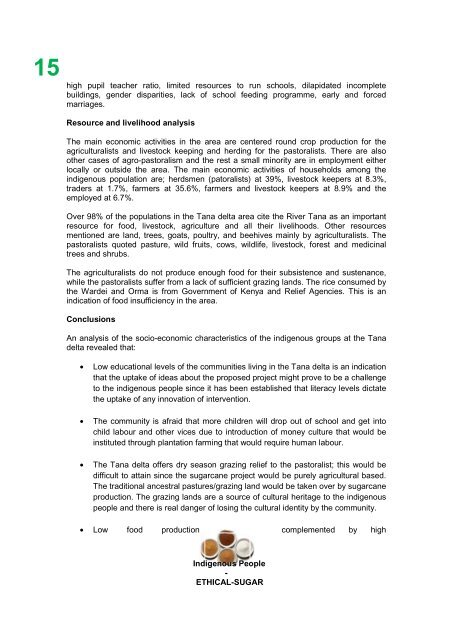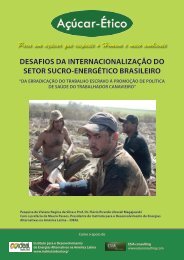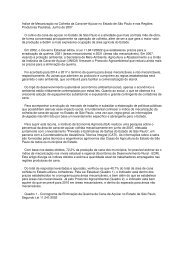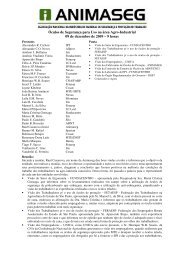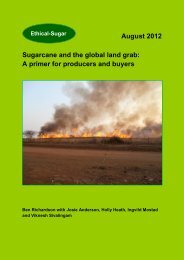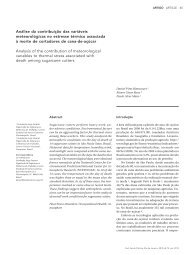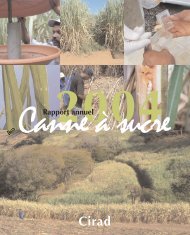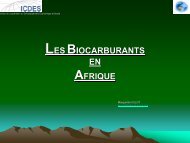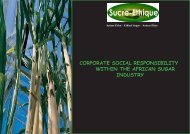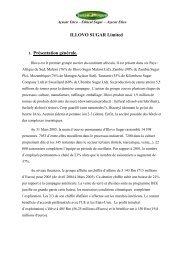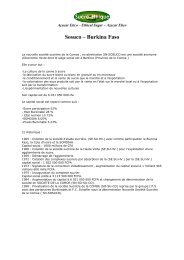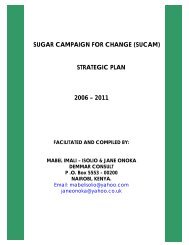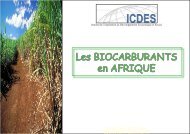Sugar Cane And Indigenous People - Sucre Ethique
Sugar Cane And Indigenous People - Sucre Ethique
Sugar Cane And Indigenous People - Sucre Ethique
You also want an ePaper? Increase the reach of your titles
YUMPU automatically turns print PDFs into web optimized ePapers that Google loves.
15high pupil teacher ratio, limited resources to run schools, dilapidated incompletebuildings, gender disparities, lack of school feeding programme, early and forcedmarriages.Resource and livelihood analysisThe main economic activities in the area are centered round crop production for theagriculturalists and livestock keeping and herding for the pastoralists. There are alsoother cases of agro-pastoralism and the rest a small minority are in employment eitherlocally or outside the area. The main economic activities of households among theindigenous population are; herdsmen (patoralists) at 39%, livestock keepers at 8.3%,traders at 1.7%, farmers at 35.6%, farmers and livestock keepers at 8.9% and theemployed at 6.7%.Over 98% of the populations in the Tana delta area cite the River Tana as an importantresource for food, livestock, agriculture and all their livelihoods. Other resourcesmentioned are land, trees, goats, poultry, and beehives mainly by agriculturalists. Thepastoralists quoted pasture, wild fruits, cows, wildlife, livestock, forest and medicinaltrees and shrubs.The agriculturalists do not produce enough food for their subsistence and sustenance,while the pastoralists suffer from a lack of sufficient grazing lands. The rice consumed bythe Wardei and Orma is from Government of Kenya and Relief Agencies. This is anindication of food insufficiency in the area.ConclusionsAn analysis of the socio-economic characteristics of the indigenous groups at the Tanadelta revealed that:• Low educational levels of the communities living in the Tana delta is an indicationthat the uptake of ideas about the proposed project might prove to be a challengeto the indigenous people since it has been established that literacy levels dictatethe uptake of any innovation of intervention.• The community is afraid that more children will drop out of school and get intochild labour and other vices due to introduction of money culture that would beinstituted through plantation farming that would require human labour.• The Tana delta offers dry season grazing relief to the pastoralist; this would bedifficult to attain since the sugarcane project would be purely agricultural based.The traditional ancestral pastures/grazing land would be taken over by sugarcaneproduction. The grazing lands are a source of cultural heritage to the indigenouspeople and there is real danger of losing the cultural identity by the community.• Low food production complemented by highEthicl<strong>Indigenous</strong> <strong>People</strong>-ETHICAL-SUGAR


